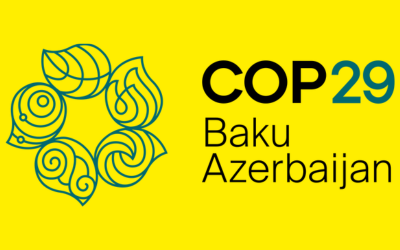The UN’s 29th Climate Change Conference of Peoples (Cop 29) will take place from the 11 to the 22nd of Nov. The under-whelming progress of previous COPs especially the last two, in Edinburgh and Dubai, have dampened interest, enthusiasm and expectations about the success of the forthcoming Baku, Azerbaijan, Conference. There is also climate fatigue among both the general public and many erstwhile activists whose efforts have born little fruit. This fact is evident in the failure of Governments to make the much lobbied for decisions and changes needed and the de facto refusal of multinational corporations to do so. Instead they hide behind minor changes and lots of greenwashing while, with the passive acquiescence of Governments, more or less continue their fossil-fuel based businesses as usual.
Another negative that prevents COP 29 getting the attention it deserves is that it is taking place at a very bad time. World attention is demanded by the destructive and horrific wars in the Middle East and Ukraine. In addition, the media is also preoccupied with the US Presidential election, as well as on-going economic and political worries. Here in Ireland, it is all but certain that we will be in the midst of a General Election Campaign while the conference proceeds. All of this has helped to push the climate crisis well down the agenda.
Last year’s Conference in Dubai went, as did previous meetings to “the wire” with time extended as those with vested interests in fossil fuels held their ground. It took an all-night debate to reach what was acclaimed as a “landmark” global climate agreement – i.e. the inclusion in the final statement of agreement to “transition away from fossil fuels” and to triple renewable power and double energy efficiency by 2030. This was not a landmark moment, it was another COP failure. The second part of this statement is a laudable target to be achieved by 2030. The first is a vague unspecific aspiration that one commentator referred as having a “constructive ambiguity.” It is an expression of unclear intent rather than the defined commitment needed. Yet, and it is hard to believe that after twenty-eight COP meetings this was the very first time that the term “fossil-fuels” has been included in a final pact statement. Previously countries such as Russia, Saudi Arabia and India had prevented in inclusion of fossil fuels due to their dependence on Oil and Coal. In Laudate Deum, an apostolic exhortation written by Pope Francis specifically to address the Dubai COP28 Conference, he expressed the hope that it would establish “binding forms of energy transition that meet three conditions: that they be efficient, obligatory and readily monitored”. This did not happen.

Looking forward to COP29 in Azerbaijan, another oil producing giant, it is hard to be hopeful given the current lack of engagement by Governments and NGOs with the climate crisis. Yet we are, as has been made very clear by the many extreme climate related events over this summer and most recently in Spain, experiencing more and more severe impacts from climate change. Climate breakdown is here now, it is not something that happens far away or in the future. Spain has also shown that the relative wealth of richer, developed countries can no longer protect them from the effects of climate change.
One good note since last year’s COP is the increase in renewable energy production. While this is encouraging the scale of increase needs to grow if targets are to be reached.
COP29 is yet another chance to agree actions commensurate with the problem – previous meetings have tinkered around the edges without addressing the core issue of a commitment to fossil-fuel reduction. Will recent events concentrate the minds of delegations from the richer countries? What is needed this time is an exponential step change from the vague “transition away from” to a defined phasing out of fossil fuels. Will it happen?

